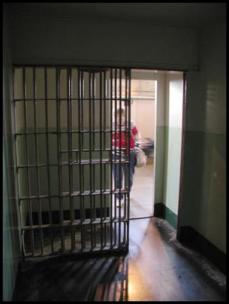Crown Argues Secret Information = Indefinite Detention
Coverage of day two of the Zaoui Detention appeal – Court of Appeal 7th September 2004
By Kevin List

"We wouldn't wear this argument anywhere else in the law" was the irritable response from Justice Hammond after listening to Deputy-Solicitor General, Cheryl Gwyn outlining the Crown's case for keeping detained refugee Ahmed Zaoui in jail indefinitely.
Ahmed Zaoui’s lawyers have appealed to the Court of Appeal to overturn a High Court decision that ruled Zaoui must be kept imprisoned while awaiting a review of a security risk certificate issued by New Zealand’s SIS in March 2003.
Justice Hammond's statement came during a debate between the bench and Crown about Habeus Corpus and why that ancient remedy for those deprived of their liberty was included in the Immigration Amendment Act (1999). During day one, the Crown had suggested Habeaus Corpus could only be triggered in the most extreme and ludicrous circumstances. (ref. see… Five Years In Jail Acceptable For Zaoui - Crown )
Yesterday, Ms Gwyn suggested five years may be an acceptable time for Ahmed Zaoui to spend in jail whilst the security risk certificate process dragged on. On day two this argument was expanded and the amount of time was moved out to possibly eight years. When quizzed about the statutory basis for the Crown's argument, Ms Gwyn was left speechless for quite some time before replying.
"I can't point you anywhere."
The Crown faced further difficulties over a legal preamble to Part IVA of the Immigration Amendment Act 1999:
The Crown reasoned Habeus Corpus could only have been included in the Immigration Amendment Act to safeguard a person from being incarcerated indeterminately – therefore Parliament presumably envisaged a process that could take five years was 'effective and quick'.
To bolster the Crown's argument Ms Gwyn had scoured the world for immigration horror stories pointing out that many immigration cases had dragged on for years overseas. Whilst there was no mention of Guantanamo Bay, Turkey was used as an example in relation to the European Union.
The Director of Security, Richard Woods', summary of allegations (against Mr Zaoui) also came in for some scrutiny from the bench. The Crown considered that despite Mr Zaoui being deemed the lowest possible risk to society by the Department of Corrections' own psychologist, the fact there was undisclosed classified information justified his continued detention. This blanket statement perplexed Justice O'Regan – who wondered how, given this argument, the Department of Corrections was able to consider Auckland Central Remand Prison, rather than say maximum security, was safe for Mr Zaoui.
Also of interest to Justice O'Regan was the fact that Mr Woods' concerns - outlined in his summary of allegations - seemingly related to Mr Zaoui actually settling in New Zealand. In this particular hearing Zaoui's lawyers were not advocating he should be allowed to settle in New Zealand, merely that he be moved from penal incarceration whilst Mr Woods concerns are put to an independent test. It was pointed out to the Crown that detention at the Mangere Refugee Centre was not actually allowing someone to settle in New Zealand.
This drew a warning from the Crown that it would be a "big call for the Court [of Appeal] to consider [releasing Zaoui from penal detention]". Presumably the inference was that second hand un-corroborated allegations that only former diplomat Richard Woods is privy to, carry far more mana than the opinion of what was until recently New Zealand's premier judicial body.
Justice O'Regan considered that on the face of Mr Woods summary of allegations there was little reason for, in his words, "very severe detention." When pressed by Justice O'Regan as to why someone who may only be affecting New Zealand's 'economic security' or 'international wellbeing' should be kept in jail, the Crown pointed out that Mr Zaoui was being held in jail specifically because of his (Mr Zaoui's) overseas convictions.
What this meant was that due to suspended sentences in foreign jurisdictions Mr Zaoui has been held in penal detention for what will be two years this December.
There was no way of knowing how the classified security information that Mr Woods supposedly has up his sleeve is connected with Mr Zaoui's convictions. All that is mentioned in Mr Woods summary is that it is "background" to the "public facts." This 'absence of information' was the excuse used by the Crown for every part of their argument that Zaoui must stay in jail and could never be moved. Mr Zaoui couldn't stay in detention at the Mangere Refugee Centre because no-one knew what risk – if any – Mr Zaoui posed. Mr Zaoui couldn't be given bail because of the 'absence of information' available.
Given a number of contradictory statements from Ms Gwyn it was not even clear if Mr Zaoui had been given a complete summary of the allegations he was supposed to have received following an earlier High Court decision. (see … Dec 2003 scoop.co.nz article).
In his final address, Dr Rodney Harrison, described the Crown's attitude to Mr Zaoui as, "a shameful stance to take". The fact that there may still be unknown allegations swirling around regarding Mr Zaoui was, "totally unacceptable". In regard to the New Zealand Immigration Service refusing to allow a psychologist with a court order access to the Mangere Refugee Centre, Dr Harrison asked the rhetorical question: "What is going on here?"
Whilst that question remained unanswered, what is now known is that some of New Zealand's best legal minds have been paid more than half a million dollars to argue that anyone who isn't a New Zealand citizen can be imprisoned indefinitely, on unknown allegations.
For more information see… Five Years In Jail Acceptable For Zaoui – Crown Argues



 Eugene Doyle: Writing In The Time Of Genocide
Eugene Doyle: Writing In The Time Of Genocide Gordon Campbell: On Wealth Taxes And Capital Flight
Gordon Campbell: On Wealth Taxes And Capital Flight Ian Powell: Why New Zealand Should Recognise Palestine
Ian Powell: Why New Zealand Should Recognise Palestine Binoy Kampmark: Squabbling Siblings - India, Pakistan And Operation Sindoor
Binoy Kampmark: Squabbling Siblings - India, Pakistan And Operation Sindoor Gordon Campbell: On Budget 2025
Gordon Campbell: On Budget 2025 Keith Rankin: Using Cuba 1962 To Explain Trump's Brinkmanship
Keith Rankin: Using Cuba 1962 To Explain Trump's Brinkmanship